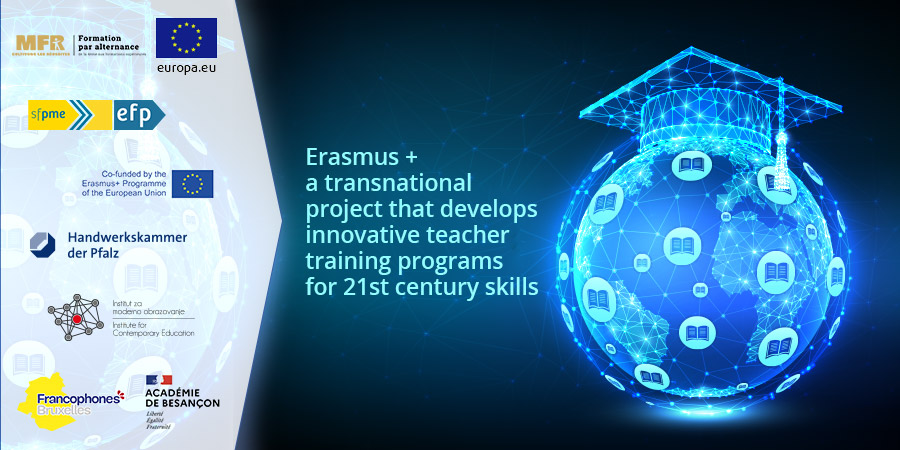
ICE chosen as strategic partner in Erasmus+ transnational program for developing innovative teacher training programs for 21st-century skills
The National Agency Erasmus+ France is financing a two-year project Citizen 2.1 as part of strategic partnerships for exchanging best practices. The project is aimed at exchanging the best practices in the field of development of educational competencies related to digital skills. The project consortium comprises renowned European educational institutions from Germany, Belgium and France, as well as the Institute for Contemporary Education (ICE), the most modern center for professional development of teachers in the Balkans.
A teacher community of interest will be formed through project activities. By exchanging information in training programs and seminars, teachers will be fully trained in the latest digital skills needed for teaching and participation in the global process of societal and educational evolution in the 21st century.
Institute for Contemporary Education as example of innovative practice that will be presented to international partners and teachers
The Institute for Contemporary Education is recognized within the international project Citizen 2.1 as an equal partner that offers the latest experiences in professional development of teachers related to the development of digital skills, and was hence given the opportunity to share their innovative approaches with partner educational institutions, innovation institutes and centers, institutions for national education and training, and chambers of commerce and industry from three European countries.
The project will comprise 4 transnational meetings and 3 training modules related to innovative digital practices for 45 teachers from France, Germany, Belgium, and Serbia. Selected teachers who get the opportunity to familiarize themselves with the latest teaching approaches will also have the chance to receive the Open Badges credentials which ensure international recognition for teachers who have acquired new digital skills awarded by the strategic partners of the Citizen 2.1 project.
The presentation of the project is available HERE.
Development of 21st-century skills – the basis for success of modern education
Practice shows that, despite various available programs in the field of digital competency development, a significant number of teachers implement educational technology very little in their teaching practice, and seldom seek ways to harmonize traditional and online teaching approaches, and this is the main reason for a huge discrepancy between teacher and student skills.
What does strategic partnership between ICE and their international partners on the Citizen 2.1 project mean for teachers in Serbia?
Through study and exchange of examples of the latest practices implemented in educational institutions, innovation institutes, educational centers, institutions for national education and training, chambers of commerce and industry, and a variety of approaches in terms of professional development: round tables, surveys, on-site visits, discussions and analyses of the best practices, as well as experimenting in practice during the training period for the transnational panel, the project Citizen 2.1 will generate exceptional value to education at a national and international level, and initiate a quick and practical application of digital tools, resources and materials, as well as expertise in their use.
Thanks to ICE participation in this important transnational project, teachers from Serbia will have the opportunity to see the results of bringing together three educational worlds on a shared mission aimed at creating innovative, practical and promising approaches for the development of digital competencies and skills in education, i.e. creation of high-quality professional development programs through research of functional and modern methods and approaches.
Main goals and tasks of transnational project development of teacher 21st-century skills
Bringing together different educational institutions and centers will highlight the creative, modern and efficient elements of the education systems of France, Belgium, Germany and Serbia, and through practical work and studious approach, allow them to answer the question of what the world of tomorrow will look like, and how to ensure quality digital education and training for teachers. In addition, the project will select the best examples of good practice which will help to quickly and easily overcome the issue of acquiring digital skills needed for success in the 21st century.
All summarized solutions and project results will be translated into an electronic handbook for teachers titled A Handbook of Good Practices, as well as a seminar on innovative digital tools.
Accordingly, the main objectives of the project are:
- defining and identifying key digital skills for 21st-century citizens,
- finding points of convergence between education and the labor market through digital tools,
- highlighting innovative and efficient training methods and approaches,
- acquiring an enriched, shared culture.
Project partners
- GIP FTLV Franche-Comté (Bourgogne Educational Region), France
- Institute for Contemporary Education, Serbia
- Handwerkskammer der Pfalz Germany, Germany
- COMMISSION COMMUNAUTAIRE FRANCAISE Belgium, Belgium
- Fédération Régionale des Maisons Familiales Rurales de Bourgogne Franche-Comté France, France
- efp Espace Formation PME Belgium, Belgium


 Srpski
Srpski




